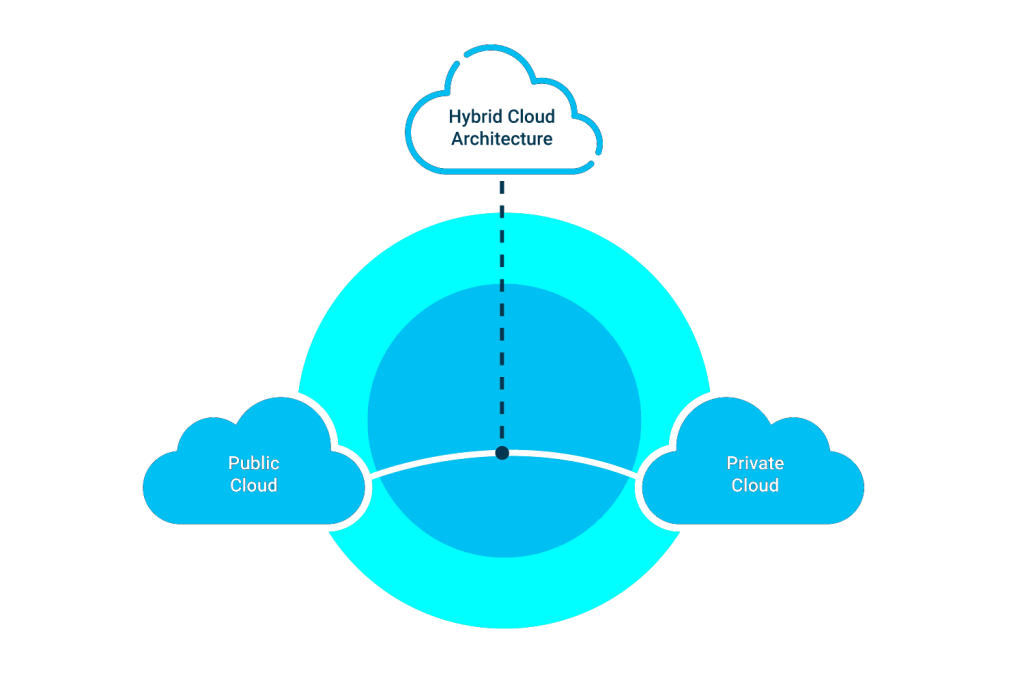What is Hybrid Cloud Computing?
Hybrid cloud computing is a model that combines the use of both public and private cloud environments in a single infrastructure. It allows organizations to leverage the benefits of both cloud deployment models, addressing specific business requirements and providing flexibility in managing their computing resources.
In a hybrid cloud setup, a company typically maintains its own private cloud infrastructure, either on-premises or in a dedicated data center. This private cloud is used to host sensitive data, critical applications, or workloads that require strict security and compliance measures. The private cloud offers greater control and customization options.
The hybrid cloud environment enables seamless integration and communication between the private and public clouds, allowing data and applications to be shared and migrated between the two environments as needed. This flexibility allows organizations to optimize their IT infrastructure, ensuring that sensitive data is adequately protected while taking advantage of the scalability and cost benefits of the public cloud.

Why do we need to use a hybrid cloud in our organization?
Flexibility and Agility: Hybrid cloud environments provide organizations with the flexibility to choose the most appropriate cloud deployment model for each workload or application. They can allocate sensitive and critical workloads to the private cloud for enhanced security and control while leveraging the scalability and cost-efficiency of the public cloud for non-sensitive workloads or fluctuating demands. This flexibility allows organizations to rapidly respond to changing business needs and optimize resource allocation.
Scalability and Elasticity: Hybrid cloud setups enable organizations to scale their resources seamlessly. During periods of increased demand or spikes in workload, they can utilize the on-demand scalability of the public cloud to meet the additional requirements. This ensures that applications and services remain highly available and performant without the need for significant investments in additional private cloud infrastructure.
Cost Optimization: With a hybrid cloud, organizations can optimize costs by using the public cloud for non-sensitive or temporary workloads, thus avoiding the need to invest in additional private cloud infrastructure. The pay-as-you-go pricing model of public cloud providers allows organizations to pay for resources only when needed, resulting in cost savings and improved cost efficiency.
Enhanced Security and Compliance: Hybrid cloud environments provide organizations with the ability to keep sensitive data and critical applications within their private cloud, which can be subject to stricter security controls and compliance regulations. This ensures that organizations have a higher level of control over their data and can implement security measures that align with their specific requirements. At the same time, they can leverage the security expertise and certifications of reputable public cloud providers for non-sensitive workloads or to augment their security measures.
Disaster Recovery and Business Continuity: Hybrid cloud setups offer robust disaster recovery and backup solutions. Critical data and applications can be replicated or backed up in the public cloud, providing an additional layer of protection and ensuring business continuity in the event of a failure or disaster in the private cloud environment. This enables faster recovery times and reduces the risk of data loss.
Geographical Redundancy and Data Residency: Hybrid cloud allows organizations to distribute their workloads and data across multiple geographic regions, taking advantage of the global infrastructure of public cloud providers. This ensures geographical redundancy and provides options for data residency compliance, allowing organizations to store and process data in specific regions to adhere to legal and regulatory requirements.
![]()
